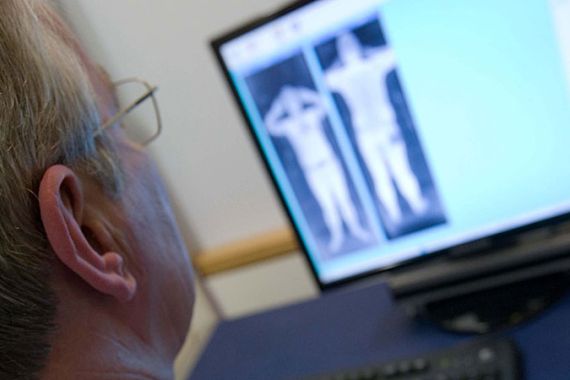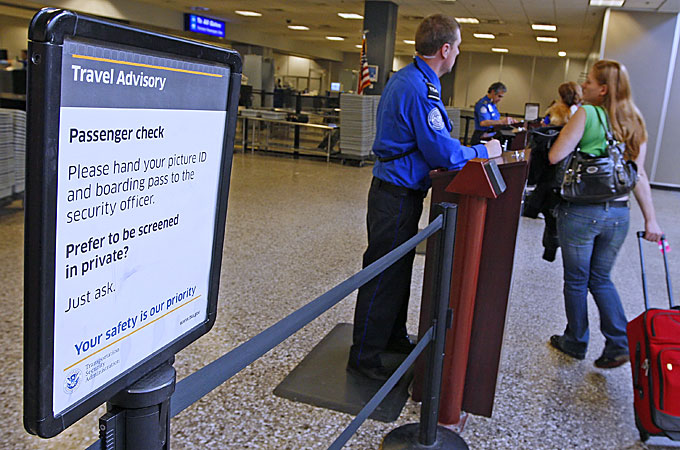Airport security checks ‘redundant’
Chairman of British Airways says UK is bowing down to US demands for flight checks that Americans do not use internally.

 |
| Security measures have been toughened up at airports following a number of foiled attack plots [EPA] |
The chairman of British Airways has criticised airport authorities for bowing down to US demands for airport security checks which he says are “completely redundant”.
Martin Broughton said people should not be forced to take off their shoes for screening or have their laptops checked separately, the Financial Times newspaper reported on Wednesday.
He added that British authorities should not “kowtow” to the US “every time they [Washington] wanted something done”, when some of the security measures imposed on international terminals were not always required on US domestic flights.
“America does not do internally a lot of the things they demand that we do,” he was quoted as saying by the paper.
“We shouldn’t stand for that. We should say: ‘We’ll only do things which we consider to be essential and that you Americans also consider essential.'”
Speaking to the UK Airport Operators Association on Tuesday, he continued: “We all know there’s quite a number of elements in the security programme which are completely redundant and they should be sorted out.
“Take the iPad, they still haven’t decided if it is a laptop or it isn’t a laptop. So some airports think you should take it out and some think you shouldn’t.”
‘Too much inconsistency’
Broughton’s comment have sparked debated among other industry officials in Britain.
Philip Hammond, the UK’s transport secretary, told Tuesday’s conference that security was a “continuing challenge to the industry”.
“I intend to develop a new regulatory system – one where the government concentrates on setting the security outcomes that need to be achieved,” he said.
Mike Carrivick, chief executive of BAR UK, which represents more than 80 scheduled airlines in the UK, said a review was needed of airport security measures.
“There seems to be a layered approach to security at airports. Every time there is a new security scare, an extra layer is added on to procedures,” he was quoted by the Press Association as saying.
“We need to step back and have a look at the whole situation. Standards change fairly regularly and this puts pressure on airports and airlines.
“We need to decide what we are trying to do and how best to do it.”
Passengers have been required to remove their shoes during airport screening checks since Richard Reid, the British “shoe bomber” hid explosives in his footwear on a transatlantic flight in 2001.
The US also stepped up security in January following an alleged bomb plot, introducing tougher screening rules for passengers arriving from 14 nations considered to be a security risk.
Colin Matthews, the chief executive of BAA, which owns Heathrow airport in London, said security measures were subject to regulations set by US, European and domestic authorities.
“There are some aspects which have been frustrating to everyone, but equally everyone understands we have to keep the passenger safe,” he told the BBC.
Security risks
Alan West, a former security minister, said a multinational agreement could make the checks “much less onerous”.
“We have had requirement on requirement laid on top of each other, and certainly I need to be convinced about all these various layers,” he said.
“I do think it does need to be rationalised because I think we have gone too far. There are too many layers, too much inconsistency.”
Justin Crump, the CEO of Sibylline Ltd, told Al Jazeera a lot of the security measures put in place were usually after the event.
“When the terrorists find something that works, and they get through, then we bring in someone to block it. We’re always playing catch up,” he said.
“But the terrorists then move on to something else as soon as they think we can counter it.”
Crump said it would work better to conduct random checks or to try to profile potential attackers.
“What’s best is a more random check method or more profiling, which is a very difficult subject, but the more intelligence work you can put into profiling potential attackers the more effective your measures are going to be,” he said.
“At the moment there is a very large blanket series of measures that are very hard for the airlines because they have to bear the cost of it.
“It is also very hard for the passengers, and balancing the two is obviously very difficult.”